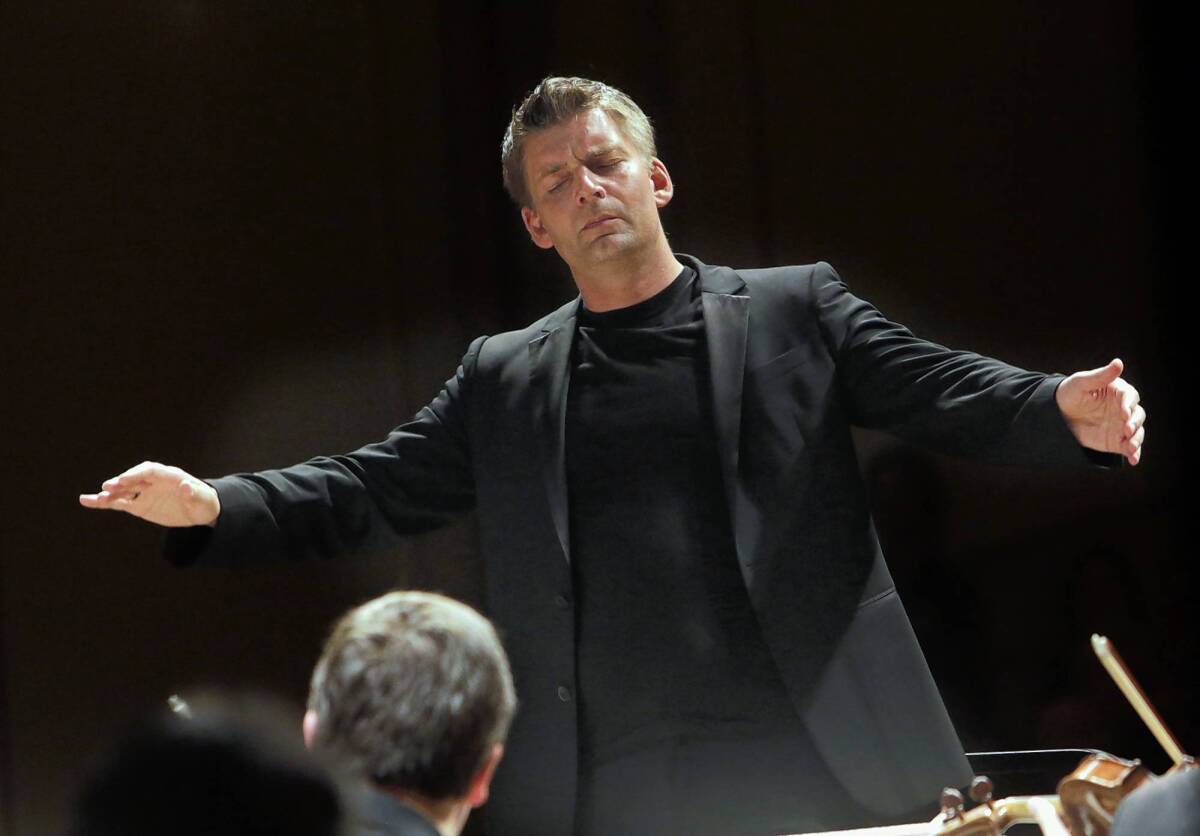Review: Matthias Pintscher’s ‘bereshit’ a worthy West Coast first

- Share via
SANTA BARBARA — Feted by the New York Philharmonic, prominent at the hotshot Salzburg and Lucerne summer festivals and about to become the next music director of the celebrated Ensemble Intercontemporain in Paris, the 42-year-old German conductor and composer Matthias Pintscher made his West Coast debut Monday night.
It was through the back door. But you couldn’t have asked for a nicer, or worthier, back door. Pintscher conducted this year’s new crop of Music Academy of the West fellows in the 350-seat Hahn Hall, overlooking a stunning stretch of Montecito coastline.
But who’s looking? This was, for several reasons, too noteworthy an occasion for that.
PHOTOS: Arts and culture by The Times
First off, it offered the young musicians a chance to work with one of the rising stars of new music. Founded in 1947 as a summer training program for young musicians, the academy originally included such noted composers as Schoenberg and Milhaud on its faculty.
But composers fell out of favor decades ago as the program became more traditional and conventional. With the presence of Pintscher and later this week the hipster string quartet Brooklyn Rider, that is suddenly changing.
Pintscher seemed to slyly acknowledge that by including two pieces from a century ago in which modern composers looked back to the Baroque — Ravel’s “Le Tombeau de Couperin” and Stravinsky’s popular ballet “Pulcinella,” that reworks Pergolesi.
More important, Pintscher brought along his latest work, “bereshit.” The half-hour score was given its world premiere by the St. Paul Chamber Orchestra in late May. This was the second performance and this time it was entrusted to youngsters who have been together a mere two weeks. Uncompromisingly modernist in style, “bereshit” is strange and slow music.
It was also entrusted to a concert series that appears to draw a conservative, if devoted and supportive, audience. Graciously addressing his listeners, Pintscher said we’d probably never heard anything before like this.
PHOTOS: Hollywood stars on stage
What a coup this was for the academy. The performance was terrific. Plus, the witnessing of young musicians master a major challenge has a way of drawing listeners in. The audience responded with the kind of enthusiasm that couldn’t better demonstrate why new music need not be, as it too often is in the U.S., dumbed down. It also doesn’t hurt that the space was intimate, with in-your-face acoustics, meaning all those strange sounds had a sense of dimensionality and immediacy.
The title comes from the Torah, bereshit meaning a beginning. The piece comes out of nowhere. A wisp of sound on the double bass is followed by a wisp of sizzling percussion, and that is followed by a harp plink, all at the edge of audibility.
The first momentary multi-hued chord at a moderate dynamic a few minutes later becomes a major event. What seems like a sustained eruption happens about a third of the way through and with ears now attuned, a world of sound begins to open up. Pintscher uses the metaphor of waking up in the middle of the night, jetlagged and in a strange hotel, needing some seconds to make sense of your environment.
For me, “bereshit” was more like learning a new language. At first, words can hardly be distinguished. Once you start to grasp them, you still may not know their meaning, so you pay attention to articulation.
Pintscher uses instruments marvelously. He has, as does Esa-Pekka Salonen, an endearing fondness for the deep gurgling of a contrabass clarinet. And part of the happiness of “bereshit” is how he makes us feel at home in an otherworldly sonic environment.
TIMELINE: Summer’s must see concerts
As a conductor, Pintscher tends toward clarity. He brought out inner voices in the Ravel and turned on neon to intensify instrumental colors. In “Pulcinella,” he seemed most interested in how much fun Stravinsky had Stravinsky-fying early Baroque music. At one point the audience laughed, and Pintscher turned around and flashed a satisfied smile.
But he also avoided exaggeration. In a fast section near the end of the ballet, he kept a flashy trombone solo from becoming grotesque. The ballet also has vocal movements; and mezzo-soprano Sara Lemesh, tenor Mingjie Lei and bass-baritone Keith Colclough sang with earnest expression but were not showy.
The orchestras (each piece had a different configuration and most different players) were impressively polished but the real satisfaction came from the sensation that these young musicians were alive to the moment and playing for the sake not of perfection but discovery. That’s a best bereshit of all, the best beginning.
MORE
PHOTOS: Hollywood stars on stage
CHEAT SHEET: Spring Arts Preview
PHOTOS: Arts and culture in pictures
More to Read
The biggest entertainment stories
Get our big stories about Hollywood, film, television, music, arts, culture and more right in your inbox as soon as they publish.
You may occasionally receive promotional content from the Los Angeles Times.











